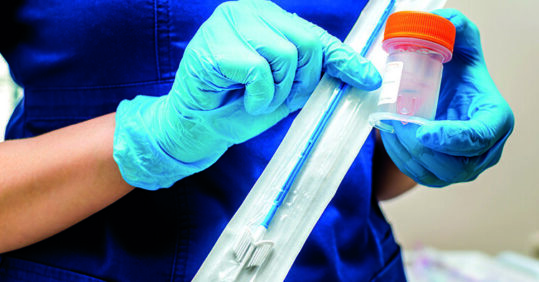Three in 10 do not take up cervical screening offer

Nearly a third of people eligible for cervical screening do not take up the potentially lifesaving offer, figures released today by NHS England show.
The NHS Cervical Screening Programme, England 2022-2023 annual report found that 68.7% of 25- to 64-year-olds had attended screening within the recommended period of time, compared to 69.9% the previous year.
The proportion was higher for 50- to 64-year-olds at 74.4%, compared to 65.8% for 25- to 49-year-olds.
The NHS invites women aged 25 to 64 for screening every three to five years, depending on their age, or more frequently if HPV is detected.
‘The cervical screening programme saves thousands of lives every year in the UK by preventing cancer and helping to stop the disease in its tracks,’ Nicola Smith, senior health information manager at Cancer Research UK, said.
Related Article: Measures to prevent cancer would be cost-effective, suggests economic report
‘We encourage women and people with a cervix, such as trans men and non-binary people assigned female at birth, to take part.’
Ms Smith continued: ‘Barriers to participation can often lead to inequalities in diagnosis and treatment, so we support targeted action to increase awareness and widen access to this potentially life-saving programme.’
The publication of the annual report comes after the NHS pledged last week to eliminate cervical cancer by 2040 by ‘making it as easy as possible for people to get the lifesaving HPV vaccination and increasing cervical screening uptake’.
Meanwhile, NHS England said that ‘targeted outreach’ and ‘offering jabs in more convenient settings’ will support health and care professionals to identify those who most need the HPV vaccine, which ‘prevents invasive strains of the virus’.
Children are currently offered one dose at 12 or 13 years of age via the school-aged immunisation service, and anyone who misses this is able to catch up with their GP practice until the age of 25.
From September this year, following advice from the Joint Committee on Vaccination and Immunisation, these groups in England were offered a single dose of the HPV vaccine instead of two.
It is ‘still important’ to attend cervical screening appointments if you have been vaccinated against HPV, as there is still ‘a small chance’ of getting cervical cancer, NHS England said.
Related Article: Mythbuster: ‘I don’t need a smear test – I’ve had my HPV jab’
Steve Russell, chief delivery officer and national director for vaccinations and screening for NHS England, said: ‘We know that it’s possible for the NHS to eliminate cervical cancer within the next two decades, but it relies on millions of people continuing to come forward for screening and vaccinations every year.
‘The NHS is doing everything we can to achieve our ambition by making it as easy as possible to make appointments, with the latest figures showing the NHS arranged cervical screening for over 3.4 million women last year.’
People can contact their GP practice to arrange a cervical screening appointment, and some sexual health clinics also offer cervical screening.
Dr Kiren Collison, a GP and NHS England’s deputy medical director for primary care, said:
‘Getting the HPV vaccination and attending screening is the best way of preventing cervical cancer, which is why it’s important that you book an appointment when invited.’
Related Article: Smoking rates fall most significantly in the North of England
Martin Hunt, chief executive of Jo’s Cervical Cancer Trust, added: ‘We urge all those who can attend to go and get tested. We understand that it’s not an easy appointment for everyone.
‘It can sometimes be difficult to attend for a variety of reasons, including work and childcare commitments, anxiety, and misinformation surrounding the test. But these tests are vital; they can prevent cancer.’
For more information on NHS cervical screening and how to book an appointment, visit nhs.uk/conditions/cervical-screening.

See how our symptom tool can help you make better sense of patient presentations
Click here to search a symptom




